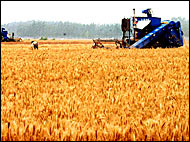
National advisers from the Chinese People’s Political Consultative Conference (CPPCC) said yesterday that there are enough grain reserves to cover immediate needs, but the future does not look bright in the long run.
Grain self-sufficiency is a key issue for a nation with 1.3 billion people, whose food consumption is mainly concentrated on grain products, said Duan Yingbi, CPPCC National Committee member, during a press conference at the annual session of the top advisory body.
"Judging from current figures, I think that in the near future there won't be any problems with the food supply," said Duan, also vice-chairman of the Economic Committee of the CPPCC.
However, he added: "In the long term I don't think we can be optimistic about the food situation due to the increased population and consumption growth caused by improvements in living standards."
"China's grain reserves at central and provincial levels exceed the UN standard of 18 percent of its annual needs," said CPPCC member Nie Zhenbang, former director of the State Grain Administration.
In grain harvests from 1996-99 output exceeded 500 billion kilograms, said Nie, adding that these enabled China to greatly enrich its national and provincial grain depots.
The grain harvest peaked at 512 million tons in 1998, then declined due to bad weather and less land being planted.
Duan said it is difficult to improve grain output when such a situation is combined with greater industrialization and urbanization.
Between 1996 and 2003, about 6.7 million fewer hectares of farmland were planted, said CPPCC National Committee member Hong Fuzeng.
Duan said that agricultural infrastructure in rural areas is rather weak, which exacerbates the problem.
Furthermore, there is a lack of long-term policies that encourage farmers and local governments to plant more grain.
Despite these problems, Duan said he is "confident that China can feed itself as long as farmers' enthusiasm for growing grain can be mobilized."
He said grain output in 2004 increased by 38.3 billion kilograms thanks to preferential policies adopted by central government.
To encourage farmers to grow more, the government has ordered an end to farm taxes, boosted subsidies and promised to spend more on irrigation and other infrastructure projects, officials said.
"High-yield farmland in China can produce 1,000 kilograms of grain per mu (0.07 hectare), 20 times higher than low-yield farmland," Hong said.
There is potential for significant increases in grain output considering that low-yield farmland accounts for only two thirds of the total, he said.
(China Daily March 7, 2005)
|

